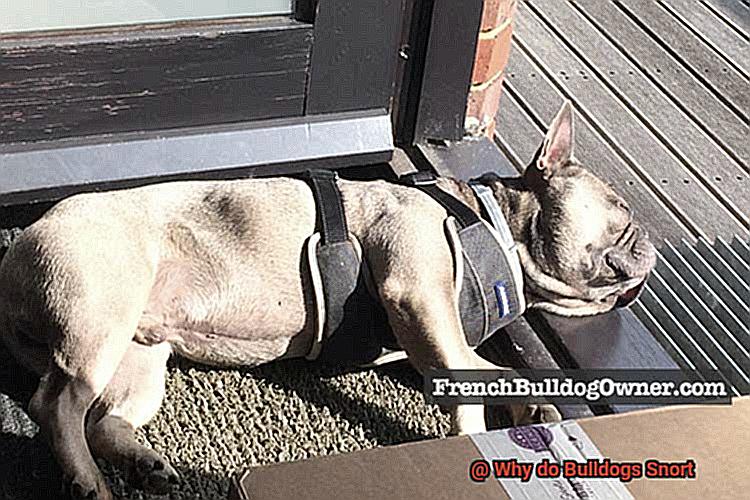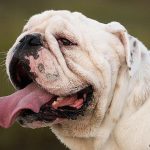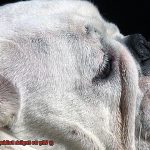Why do Bulldogs Snort?
Do you ever wonder why your Bulldog snorts so much? It’s a common question among Bulldog owners. The answer is simple: Bulldogs snort due to their anatomy.
In this blog post, we’ll explore why Bulldogs snort and how to support them in managing their snorting tendencies.
We’ll look at the unique shape of their faces, their breathing habits, and more.
So if you’re curious about why your Bulldog snorts, keep reading for all the answers!
History of the Bulldog Breed
Contents
The Bulldog breed has a long and distinguished history that dates back to the ancient Greeks and Romans. Bulldogs were originally bred as fighting dogs, but over time they have become beloved companion animals.
Bulldogs are known for their muscular build, short legs, and wide head. They also have a unique look with their wrinkled face, droopy eyes, and pushed-in nose. Bulldogs are friendly, loyal animals that make great family pets.

But one of the most recognizable characteristics of Bulldogs is their loud snorting sounds when they breathe! This endearing trait makes them even more lovable and adds to their charm.
Anatomy and Physiology
Bulldogs are known for their snorting, but why? It turns out that the structure of a bulldog’s nose has a lot to do with it. Bulldogs have a short, flat muzzle which results in a shorter nasal passage and less air flow. This can cause them to snort more than other breeds.
The anatomy of the bulldog’s nose is also responsible for their snorting. They have shorter nostrils than other breeds, so they can snort when they breathe. In addition, bulldogs have a narrow trachea which can make it difficult to get enough air into their lungs and cause them to snort.

Snoring is also common among bulldogs; their soft palate can collapse into the back of their throat during sleep, leading to loud snoring. Lastly, facial wrinkles on bulldogs’ faces trap moisture and debris in the nose, causing blockages and further contributing to their snorting habits.
Why do Bulldogs Snort?
Bulldogs are known for their lovable, squishy faces – and snoring. But did you know that excessive snorting in bulldogs can be a sign of an underlying health condition? Let’s explore some of the most common causes of snorting in bulldogs.
Poor airway structure is one of the main factors that can lead to snoring in bulldogs. With their unique, flat faces, they often have short nasal passages and narrow throats, which can make it difficult to breathe properly.

Obesity is another common cause of snorting in bulldogs. If your pup is overweight, fat deposits in the neck area can block their airways and lead to snoring.
Allergies can also be a factor, as inflammation in the airways can make it hard for your pup to breathe and result in snoring.
Respiratory infections such as kennel cough or pneumonia can also cause congestion in the respiratory system, resulting in snoring.
Finally, brachycephalic syndrome is a condition where the soft tissues of the throat are too large for the size of the throat, making it difficult to breathe and causing excessive snorting.
It’s important to keep an eye out for any signs of excessive snoring in your bulldog – this could indicate an underlying health issue that needs attention right away.
Health Issues Related To Snorting
Snorting is a common and potentially serious problem for many bulldogs. If your pet has been snorting for an extended period of time, it’s important to take them to the vet for an evaluation.
One of the most common causes of snorting in bulldogs is brachycephalic airway syndrome (BAS). This condition affects dogs with shorter snouts, making it difficult for them to breathe. Surgery may be necessary to correct the issue.
Other potential health concerns that may be linked to snorting in bulldogs include allergies, infections, bowel obstructions, heart disease, thyroid problems, and obesity.
If your pet is exhibiting any of these signs in addition to snorting, it’s best to have them checked out by a veterinarian as soon as possible.
It’s essential to pay close attention to your bulldog’s breathing and look out for signs of snorting or difficulty breathing.
Ways to Reduce Snorting
Bulldogs are known for their snoring, but excessive snorting could indicate underlying health issues. To ensure your Bulldog is healthy and happy, here are six ways to reduce snorting in Bulldogs.
Keep Them Calm
A calm and relaxed environment can help minimize snorting in Bulldogs. Provide a comfortable space for them to rest and avoid loud noises or sudden movements that may startle them and trigger the snoring reflex.
Limit Eating and Drinking
Over-eating or drinking can cause the Bulldog to snort more frequently as it has difficulty breathing. Monitor their diet and ensure they get a balanced diet with limited treats throughout the day, as well as restricting their water intake when not needed.
Check For Obstructions
It is important to check for any obstructions in the Bulldog’s nose such as dirt or debris that could be causing it to snore more often than usual. Regularly clean your Bulldog’s nose and look out for any blockages that might cause it to snore more than normal.
Monitor Temperature and Humidity
Keeping the temperature and humidity levels within a comfortable range can help reduce snoring in Bulldogs. Make sure your house is not too hot or humid as this may cause your dog to get sick and start snoring more often than normal.
Track Snoring Habits
Keeping track of your Bulldog’s snoring habits can help you identify patterns that might be causing it to snore more often than usual. Changes in its diet, climate, or sleeping habits may be contributing to excessive snoring.
Use Specialized Products
There are specialized products available on the market that can help reduce snoring in Bulldogs, such as special beds, collars, and even masks that cover their noses while they sleep. These products won’t completely eliminate all of their snoring but they could still provide some relief if used correctly.
Reducing excessive snorting in Bulldogs requires patience and dedication from owners but following these guidelines will help create a safer environment for their pet while also reducing the tendency of excessive snoring.
Training Your Bulldog Not to Snore
If you’re a bulldog owner, you know that teaching your pup not to snore is an essential part of being a responsible pet parent. Proper training can help reduce or even eliminate unwanted behaviours like snoring. The sooner you start training your bulldog, the better chance you have of preventing bad habits from taking root.
Positive reinforcement is key when it comes to raising your bulldog. Whenever your pup does something right, be sure to reward them with treats and verbal praise. Teach basic commands such as sit, stay, and come so you can have more control over their behaviour.
Consistency in training is also important; don’t give up if you don’t see results right away – it may take some time for them to learn new behaviours and stop snoring. If you’re having trouble getting your bulldog to stop snoring or other undesired behaviours, consider consulting with a professional dog trainer who can help.
You can help reduce or even eliminate unwanted behaviours in your bulldog such as snoring by following these tips and being a responsible pet parent.
Diet Changes for Your Bulldog
There may be a solution: diet changes. Bulldogs are prone to obesity due to their short legs and broad chests, which can lead to respiratory complications. A diet tailored to the needs of your bulldog can help them maintain a healthy weight and reduce snorting.
When selecting food for your bulldog, opt for high-quality ingredients with plenty of protein, fat, and carbohydrates. Avoid foods that are high in sugar or artificial additives as these can cause digestive problems.
Additionally, make sure your bulldog has access to fresh water throughout the day to stay hydrated.
You should also consider adding supplements such as omega-3 fatty acids, probiotics, and glucosamine to your bulldog’s diet. These supplements can help support joint health and strengthen the immune system which may reduce snoring.
Finally, it is important to feed your bulldog on a regular schedule and avoid overfeeding them as this can lead to weight gain and exacerbate snoring issues. If you have any questions about what type of food or supplements are best for your bulldog, consult with a veterinarian for advice.
Also Read: Why Do French Bulldogs Snort?
Conclusion
Bulldogs are beloved for their lovable personalities and adorable snorting. But why do they snort? We’ve explored the anatomy of a bulldog’s nose, common causes of snorting, potential health issues related to it, methods to reduce snorting, and training tips to help prevent it from occurring.
We also discussed dietary changes that may help decrease excessive snorting in Bulldog breeds.
Gaining an understanding of the anatomy of a bulldog’s nose is the first step in comprehending why they are prone to snoring.
Excessive snoring can be indicative of underlying health problems, so it’s essential to pay close attention to your dog’s breathing habits and take them to the vet if there are any changes.
There are several approaches to lessen or eliminate undesirable behaviours in Bulldogs, such as snoring.




